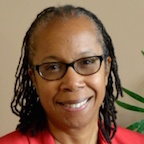 Rhondda Robinson Thomas, an associate professor of English at Clemson University in South Carolina is undertaking a new study of African Americans who lived on university property prior to the racial integration of the student body in 1963. Dr. Thomas learned that African American convicts were used to construct some of Clemson’s earliest buildings. Some of these convicts were former slaves or children of slaves. Her research discovered that the youngest of the convict laborers was a 12-year-old African American.
Rhondda Robinson Thomas, an associate professor of English at Clemson University in South Carolina is undertaking a new study of African Americans who lived on university property prior to the racial integration of the student body in 1963. Dr. Thomas learned that African American convicts were used to construct some of Clemson’s earliest buildings. Some of these convicts were former slaves or children of slaves. Her research discovered that the youngest of the convict laborers was a 12-year-old African American.
After completing her research, Dr. Thomas plans to develop a website and a mobile application, and to write a book on her findings.
Robert H. Jones, provost at Clemson, said that “Dr. Thomas’s scholarly work on the early history of Clemson University is providing new and truly fascinating insight into the lives of people who labored to construct the campus. We are seeing that Clemson’s beginning reflects both good and tragic elements of the social and economic fabric of late 19th-century South Carolina.”
The research is being funded in part by James E. Bostic Jr. and his wife Edith of Atlanta. In 1972, James Bostic was the first African American to earn a doctorate at Clemson. He is a former executive with Georgia-Pacific Inc. Bostic stated that “We can’t change history, but I want us to know about it, and for us to talk about it.”
Dr. Thomas joined the Clemson University faculty in 2007. She is the author of Exodus: A Cultural History of Afro-Atlantic Identity, 1774-1903 (Baylor University Press, 2013) and the co-editor of The South Carolina Roots of African American Thought (University of South Carolina Press, 2014). Dr. Thomas holds a master’s degree in literature from the University of New Hampshire and a Ph.D. in English from the University of Maryland at College Park.










Dr. Thomas,
I certainly hope your study clearly distinguish between the Black/African-Americans men who were “wrongly convicted” but were classified as “convicts” according to unjust law in South Carolina along with the entire country. More important, now that you have the names of the Black/American men who were exploited by Clemson University, do you think the heirs of these individuals are entitled to being “made whole” (e.g., reparations)?